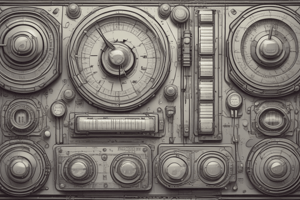Podcast
Questions and Answers
What is the primary function of the knob in a multimeter?
What is the primary function of the knob in a multimeter?
- To display the measured value
- To detect electrical current
- To connect the leads to the circuit
- To change the parameter to be measured (correct)
What is the correct sequence of connecting a multimeter to measure voltage?
What is the correct sequence of connecting a multimeter to measure voltage?
- It does not matter
- Low (Black lead) first and then High (Red lead) (correct)
- High (Red lead) first and then Low (Black lead)
- Both leads at the same time
What is the purpose of the COM port in a multimeter?
What is the purpose of the COM port in a multimeter?
- To connect the black lead (correct)
- To measure current
- To measure voltage
- To display the measured value
What is the recommended range for measuring a 9V battery using a manual ranging multimeter?
What is the recommended range for measuring a 9V battery using a manual ranging multimeter?
What is the correct sequence of connecting a multimeter to measure AC voltage?
What is the correct sequence of connecting a multimeter to measure AC voltage?
What is the definition of current in the context of electrical circuits?
What is the definition of current in the context of electrical circuits?
What is the purpose of a multimeter in electrical circuits?
What is the purpose of a multimeter in electrical circuits?
What is the recommended practice when connecting a multimeter to measure AC voltage?
What is the recommended practice when connecting a multimeter to measure AC voltage?
What is the function of the V Ω port in a multimeter?
What is the function of the V Ω port in a multimeter?
What is the purpose of setting the function to VDC or V on a multimeter?
What is the purpose of setting the function to VDC or V on a multimeter?
Flashcards are hidden until you start studying
Study Notes
Electrical Loads
- A load is any electrical component that draws current, such as a lamp, stereo, motor, or heating element.
- Each load has a rated current limit that should not be exceeded to avoid excessive heat, insulation damage, component failure, and possible fire hazards.
Continuity Measurement
- Continuity is a quick check to see if a circuit is complete.
- Good fuses and closed switches have continuity.
- During a continuity measurement, the multimeter sends a small current potential through the circuit to measure the resistance of the circuit.
- Most multimeters indicate continuity from 0 to 50 ohms and may have an audible alarm.
Resistance Measurements
- Resistance is measured in Ohms (Ω).
- The circuit should be de-energized or turned off before measuring resistance to avoid damaging the meter.
- Most meters have overload protection on all ranges to prevent damage.
- Place the test leads on each side of the resistor to measure resistance.
Capacitance Measurement
- A capacitor is a device that stores energy.
- Multimeters can measure capacitance.
Multimeter
- A multimeter is a device that measures AC/DC voltage, current, and resistance.
- It is also called the Volti-Ohm Milliammeter (VOM) or a Multitester.
- Multimeters are used for various purposes, such as measuring DC and AC voltage, detecting short circuits, testing transistors, measuring capacitance, and frequency.
Types of Multimeter
- There are two types of multimeter: Analog Multimeter and Digital Multimeter.
Analog Multimeter
- Analog meters use a needle movement and calibrated scale to indicate values.
- The input impedance of an analog meter is expressed in Ohms per Volt.
Digital Multimeter (DMMs)
- Digital Multimeters feature a digital or liquid crystal display (LCD).
- Measurement readings are displayed as numerical values on the LCD Display.
- Digital Multimeters and Clamp meters use different techniques internally to measure AC, DC voltage, resistance, and amperes.
Parts of a Digital Multimeter
- A digital multimeter has three parts: LCD display, Selection knob, and Ports.
- Ports are the points where the probes (Red and Black) are plugged into for positive and negative connection.
- The knob is used for changing the parameter to be measured.
Measurement Functions
- Multimeters can measure various parameters, including voltage, current, resistance, and capacitance.
- Each parameter has a specific symbol and function on the multimeter.
Voltage Measurements
- Voltage measurements are perhaps the most common function used on a multimeter.
- Voltage is measured between two points, so solid contact is necessary at each point.
- The proper way to connect a meter is to connect the low or ground (black lead) first and the high (Red lead) next.
DC Voltage Measurements
- To measure DC voltage, place the Red lead into the V Ω COM port and turn the dial or switch to VDC or V.
- Set the range to the appropriate value (e.g., 20 V range for a 9V battery).
AC Voltage Measurement
- To measure AC voltage, place the Red lead into the V Ω port and black lead into the COM port.
- Turn the dial or switch to VAC or V ̴ and set the range to the appropriate value (e.g., 200 V range for a 120V outlet).
Current Measurements
- Current is the electron flow that causes electrical equipment to operate.
- When the equipment is turned on, it is considered a "load" on the circuit.
Studying That Suits You
Use AI to generate personalized quizzes and flashcards to suit your learning preferences.




